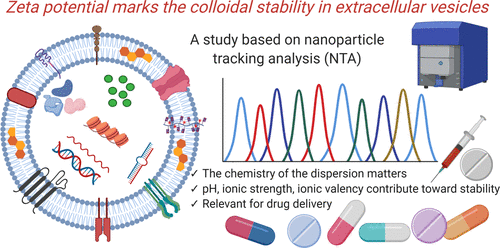Our official English website, www.x-mol.net, welcomes your
feedback! (Note: you will need to create a separate account there.)
Zeta Potential of Extracellular Vesicles: Toward Understanding the Attributes that Determine Colloidal Stability.
ACS Omega ( IF 3.7 ) Pub Date : 2020-06-30 , DOI: 10.1021/acsomega.0c01582 Getnet Midekessa 1 , Kasun Godakumara 1 , James Ord 1 , Janeli Viil 1 , Freddy Lättekivi 1 , Keerthie Dissanayake 1 , Sergei Kopanchuk 2 , Ago Rinken 2 , Aneta Andronowska 3 , Sourav Bhattacharjee 4 , Toonika Rinken 2 , Alireza Fazeli 1, 5
ACS Omega ( IF 3.7 ) Pub Date : 2020-06-30 , DOI: 10.1021/acsomega.0c01582 Getnet Midekessa 1 , Kasun Godakumara 1 , James Ord 1 , Janeli Viil 1 , Freddy Lättekivi 1 , Keerthie Dissanayake 1 , Sergei Kopanchuk 2 , Ago Rinken 2 , Aneta Andronowska 3 , Sourav Bhattacharjee 4 , Toonika Rinken 2 , Alireza Fazeli 1, 5
Affiliation

|
Extracellular vesicles (EVs), including exosomes and microvesicles (<200 nm), play a vital role in intercellular communication and carry a net negative surface charge under physiological conditions. Zeta potential (ZP) is a popular method to measure the surface potential of EVs, while used as an indicator of surface charge, and colloidal stability influenced by surface chemistry, bioconjugation, and the theoretical model applied. Here, we investigated the effects of such factors on ZP of well-characterized EVs derived from the human choriocarcinoma JAr cells. The EVs were suspended in phosphate-buffered saline (PBS) of various phosphate ionic concentrations (0.01, 0.1, and 1 mM), with or without detergent (Tween-20), or in the presence (10 mM) of different salts (NaCl, KCl, CaCl2, and AlCl3) and at different pH values (4, 7, and 10) while the ZP was measured. The ZP changed inversely with the buffer concentration, while Tween-20 caused a significant (p < 0.05) lowering of the ZP. Moreover, the ZP was significantly (p < 0.05) less negative in the presence of ions with higher valency (Al3+/Ca2+) than in the presence of monovalent ones (Na+/K+). Besides, the ZP of EVs became less negative at acidic pH, and vice versa. The integrated data underpins the crucial role of physicochemical attributes that influence the colloidal stability of EVs.
中文翻译:

细胞外囊泡的Zeta电位:旨在了解决定胶体稳定性的属性。
胞外小泡(EVs),包括外泌体和微泡(<200 nm),在细胞间通讯中起着至关重要的作用,并在生理条件下带有净负表面电荷。Zeta电势(ZP)是一种常用的测量电动汽车表面电势的方法,可作为表面电荷的指标,并受表面化学,生物共轭和应用的理论模型影响而产生的胶体稳定性。在这里,我们研究了这些因素对人绒毛膜癌JAr细胞衍生的特性良好的电动汽车的ZP的影响。将电动车悬浮在各种磷酸盐离子浓度(0.01、0.1和1 mM)的磷酸盐缓冲盐水(PBS)中,有无洗涤剂(Tween-20)或存在(10 mM)不同盐(NaCl) ,KCl,CaCl 2和AlCl 3),并在不同的pH值(4、7和10)下测量ZP。ZP与缓冲液浓度成反比,而Tween-20导致ZP显着降低(p <0.05)。此外,与一价离子(Na + / K +)存在相比,在具有更高价数的离子(Al 3+ / Ca 2+)存在下,ZP的负离子显着减少(p <0.05 )。此外,电动汽车的ZP在酸性pH值上变得越来越小,反之亦然。集成数据巩固了影响电动汽车胶体稳定性的物理化学属性的关键作用。
更新日期:2020-07-14
中文翻译:

细胞外囊泡的Zeta电位:旨在了解决定胶体稳定性的属性。
胞外小泡(EVs),包括外泌体和微泡(<200 nm),在细胞间通讯中起着至关重要的作用,并在生理条件下带有净负表面电荷。Zeta电势(ZP)是一种常用的测量电动汽车表面电势的方法,可作为表面电荷的指标,并受表面化学,生物共轭和应用的理论模型影响而产生的胶体稳定性。在这里,我们研究了这些因素对人绒毛膜癌JAr细胞衍生的特性良好的电动汽车的ZP的影响。将电动车悬浮在各种磷酸盐离子浓度(0.01、0.1和1 mM)的磷酸盐缓冲盐水(PBS)中,有无洗涤剂(Tween-20)或存在(10 mM)不同盐(NaCl) ,KCl,CaCl 2和AlCl 3),并在不同的pH值(4、7和10)下测量ZP。ZP与缓冲液浓度成反比,而Tween-20导致ZP显着降低(p <0.05)。此外,与一价离子(Na + / K +)存在相比,在具有更高价数的离子(Al 3+ / Ca 2+)存在下,ZP的负离子显着减少(p <0.05 )。此外,电动汽车的ZP在酸性pH值上变得越来越小,反之亦然。集成数据巩固了影响电动汽车胶体稳定性的物理化学属性的关键作用。










































 京公网安备 11010802027423号
京公网安备 11010802027423号